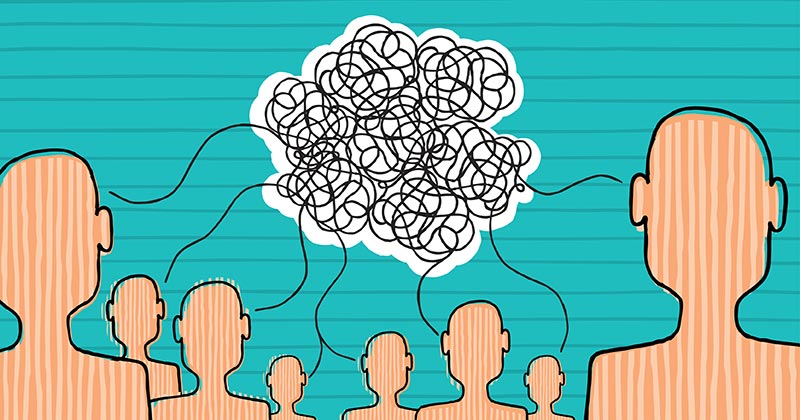Human psychology is one of the most popular study areas. You can major in the discipline as part of an arts, criminology, human resource management, marketing, science or social science degree.
What makes psychology so special that the field is relevant to so many others? And why are large numbers of students enrolling to study it at university?
The quick answer is that psychology is a powerful and fascinating topic. After all, students learn about the mind, social behavior, and well-being. But let’s dive in deeper and explore what the field of study is about and why it is important to our lives.
Definition
Human psychology is the study of the mind and its influence on behavior. It is the act of seeking to understand how our thoughts, emotions, and perceptions shape our actions.
By studying mental processes, we gain a deeper understanding of ourselves and how to interpret the actions of others.
The applications of this knowledge are vast, from therapeutic settings like hospitals to managing people in a business context, and improving the learning experiences of students.
10 Interesting Psychology Facts and Insights
To better understand what psychology is and its role in society, here are 10 psychology facts that shed light on this field of study. Learn about its origins, misconceptions, diverse subfields, and real-world impacts.
1. Psychology examines both the mind and behavior

In studying psychology, you examine how the human mind results in behavior patterns. The term psychology originates from the ancient Greeks, with “psyche” meaning spirit or soul and “logia” meaning the study of.
Despite these originating terms being thousands of years old, psychology is actually a relatively young area of research. While it may be considered a new discipline, psychology is also one of the fastest-growing and impacts almost every part of our lives.
Psychologists can be found almost everywhere – from hospitals and schools, to businesses and private practice. The roles are also incredibly varied, covering duties such as treating mental illness to research that influences government policies. Working with a psychology professional prepares clients for the challenges life might have in store.
2. It’s not just common sense

One of the biggest misconceptions surrounding the study of psychology is the false belief that it is just common sense. This could not be further from the truth, and the field is actually based on multiple scientific methods.
Psychology research has demonstrated that you cannot rely on common sense to explain human behavior. For example, people would not engage in activities that they know to be harmful, such as smoking, if common sense was actually that common. The underlying reasons why people behave they way they do are often complex and/or surprising.
Studying psychology centres on a process of asking and investigating questions in order to draw conclusions. A range of empirical methods are used to unveil the relationship between variables. You apply techniques such as naturalistic observation, case studies, experiments and questionnaires.
Related: Difference Between Counselling and Psychology
3. Psychology study is incredibly varied
While the study of psychology is about looking at the human mind and how it impacts behaviour, many different subfields exist. Just like medical studies, students can specialise in certain areas, such as clinical psychology, cognitive psychology, social psychology or developmental psychology.
These subfields are diverse, with each area focusing on different aspects of the human psyche. Some psychologists focus on helping individuals suffering from psychological distress or disorder, while other clinical sections support those presenting with physical health issues.
Psychology is not just about treating mental health either. Subsections such as forensic psychology or industrial-organisational psychology examine real-world issues and contribute towards public policies.
Some psychologists also specialise in mental focus and motivation. They help athletes, sports stars and business owners to achieve greater clarity in their goals, pushing them on to achieve their best.
Psychology and the media: Sandmann framing bias example

Framing bias is a psychological concept that everyone should be aware of as it is routinely used by reporters and advertisers. To explain framing bias, consider the case of Nicholas Sandmann. The Kentucky teenager sued multiple media outlets for defamation and, in particular, depicting him as an aggressive racist.
Media reports portrayed a viral 2019 video involving Sandmann as showing a “Native American elder and Vietnam War veteran” and “a group of teens harassing and mocking him” (CNN). In fact, Sandmann was in a group of people waiting for a bus when approached by the man, who proceeded to beat a drum and chant close to Sandmann’s face.
The media neglected to show crucial footage that explained the incident, instead focusing on the moment of confrontation. By introducing the instigator in a positive light and as a member of a minority group, Sandmann could easily be presumed to be at fault for the confrontation occurring.
4. You learn how to improve the lives of others
Although there are many different fields within psychology that students can specialise in, the ultimate goal is to help improve the lives of others. In order to do this, psychologists strive to understand, describe and predict human behaviour.
While the overall goal might be the same, the methods used vary depending on the chosen subfield. For example, some psychologists will work in hospitals or clinics, operating directly with individuals experiencing mental health issues. In these instances, they will help them on a one-to-one basis to improve their lives and achieve their goals.
Psychologists specialising in other sectors might not work directly with an individual. Those working in an applied setting use their research and results to help solve real-world issues, such as youth self-harm, and advise on policies that help societiel well-being.
Related: What Does a Psychologist Do?
5. Psychology courses help you better understand yourself

Although psychology is about the study of the human psyche with the goal to improve the lives of others, psychology courses can also help you to better understand yourself. As students progress through their studies and career, they gain insight their own experiences, motivations and behaviour.
Greater understanding comes naturally as you investigate issues and remedies and reflect on how they might relate to your own life. You are increasingly able, therefore, to recognise and acknowledge your own traits and behavioural tendencies.
Personal insight allows you to become your own coach. For example, you may come to understand why you avoid taking certain risks with relationships or career. Armed with that knowledge, you may be able to make better choices in the future.
A deeper understanding of yourself also helps you build stronger relationships with friends and loved ones. You learn the value of connections and what steps you could take to build stronger friendship networks.
Related: Psychology Courses Online in Australia
6. Graduates understand the diversity of humanity
Studying psychology helps you to appreciate and understand the diversity of the human race. Everyone has their own unique traits, experiences and background that influence behaviour and attitudes. Psychology helps you to comprehend how someone’s mindset is the product of many factors.
Understanding personality types and the benefits and challenges that come with each helps you to be empathetic. When you are able to see the differing views and that not everyone feels or thinks the same, you can better understand the communities we live in. Cultural neuroscience is an emerging field that investigates how behavior is affected by population genetics and culture.
Psychology is about understanding there are multiple ways of looking at the world. You learn not to take your personal view as somehow the correct perspective. Everyone has different life experiences that shape their behaviour and personality, requiring empathy and understanding.
7. Demand for expertise is growing
The demand for psychology professionals has never been greater. We live in an incredibly fast-paced world that is presenting new challenges. While the digital revolution has helped to enhance life in many ways, our use of devices has also created significant pressures.
Many individuals are now finding it incredibly difficult to find time to themselves, while social media is creating a greater need for validation. This is leading to a host of undesirable behaviours, such as anxiety, depression, irritability and sleep deprivation.
Alongside this, society as a whole is also far more open and accepting to seeking professional help for mental health issues. Healthcare practitioners, such as nurses and social workers, often complete mental health postgraduate courses to better deal with troubled clients. As awareness of psychological issues grows, more and more individuals are turning to skilled psychologists for help.
The demand for qualified professionals is rising, a trend showing no signs of slowing down. Among the fastest growth areas according to BLS data are: marriage and family therapy; and counselling for substance abuse, behavioural disorders and mental health.
8. Psychology impacts almost every part of life

Psychology is involved in almost every aspect of our lives. Some people might think of it as an academic principle that is reserved for hospitals or classrooms. But psychology is widely used in everyday situations.
For example, psychology is used to capture your attention and keep you engaged throughout the day. You see it at work in the adverts on TV, the social media feeds you browse through, and the mix of headlines and images on websites.
As another example, studying psychology helps you to adapt your day-to-day routine. Behavioural psychology can help you to quit those bad habits, while motivational psychology can help you stick to your exercise plan. Each choice in everyday life can potentially be informed by psychology training.
9. A psychology major is relatively easy
A Bachelor of Psychology or a similar degree provides a general education and is accessible to students with a broad range of academic abilities. Consequently, psychology is not a hard major. The difficulty level is comparable to other generalist majors such as business and the social sciences.
The fact is that more people are interested in studying psychology than there are demands for licensed psychologists. As a result, while a psychology major offers foundational training in the subject, it isn’t particularly rigorous. Its design partly aims to give students transferable skills.
Psychology is less challenging than professional degrees such as engineering, law, and computer science. This isn’t to diminish the value of the degree, but it’s essential to recognize its intent. Universities structure these programs with the understanding that many students won’t go on to do the advanced studies required to practice as a psychologist.
Related: Jobs with a Psychology Degree
10. Psychology is a STEM field
Psychology is fundamentally a science focused on the mind and human behavior. Within a psychology degree, students learn about scientific theories, research methods, and statistical analysis. This isn’t just about understanding emotions; it’s the scientific study of what humans do using empirical methods.
Many who graduate in psychology become researchers, using scientific methods to analyze data and test hypotheses. In clinical settings, evidence-based approaches are used for diagnosis and treatment. Given its strong foundation in science, both in education and in practice, it’s clear that psychology firmly belongs in the STEM category.

Samantha
As someone from the healthcare field, I would personally say that Psychology is a very fascinating topic. You can understand so much more about why a person acts a certain way and their triggers. Personally, focused meditation and quiet reflection per a day helps me focus and think better.
Rebecca A.
One of the reasons I have looked into getting a psychology degree was down to what you mentioned. The media manipulation and how they twist the narratives to frame things to fit whatever emotion they want the viewer to convey… AND IT WORKS! I have become fascinated with it! This is a great read.